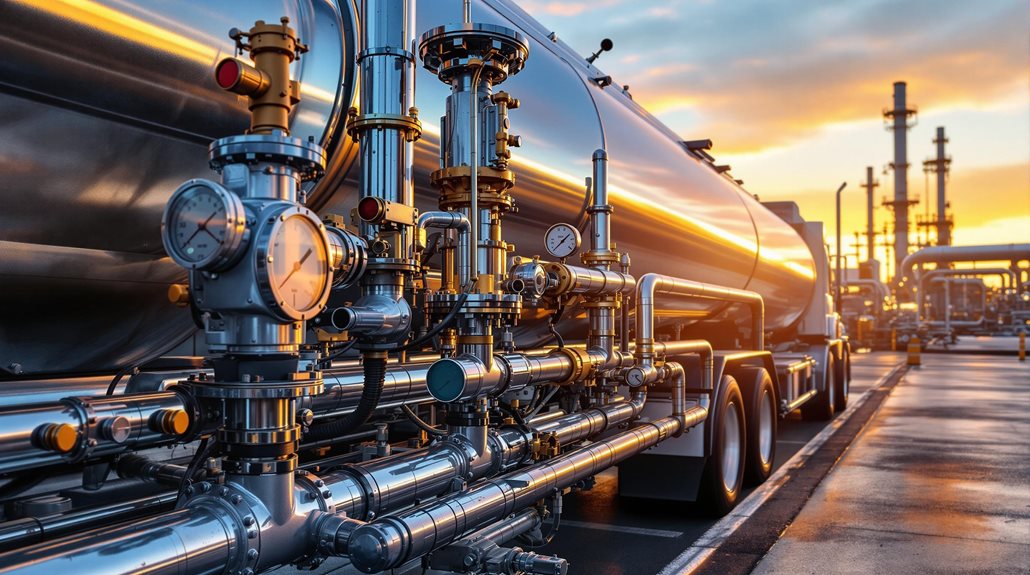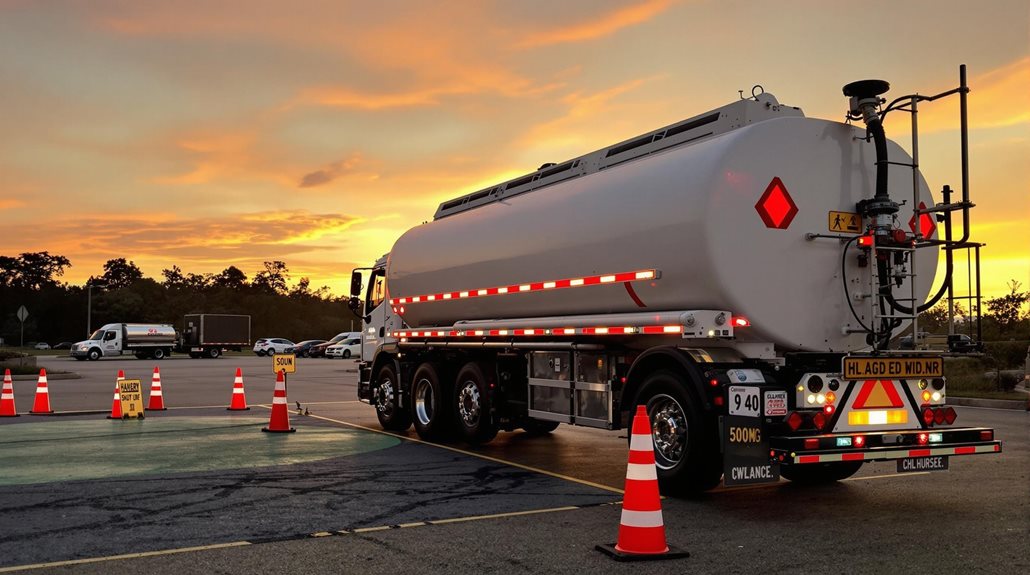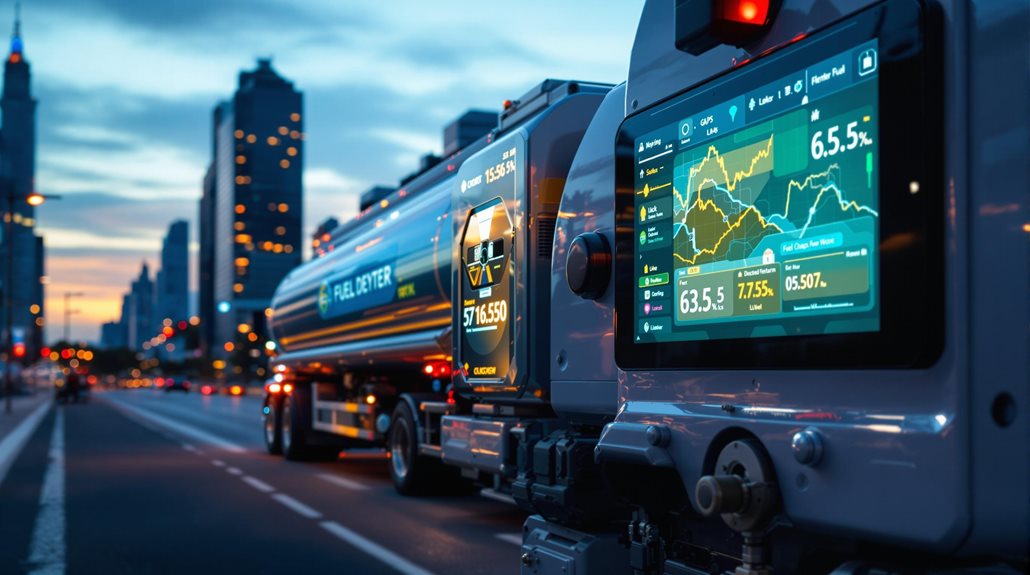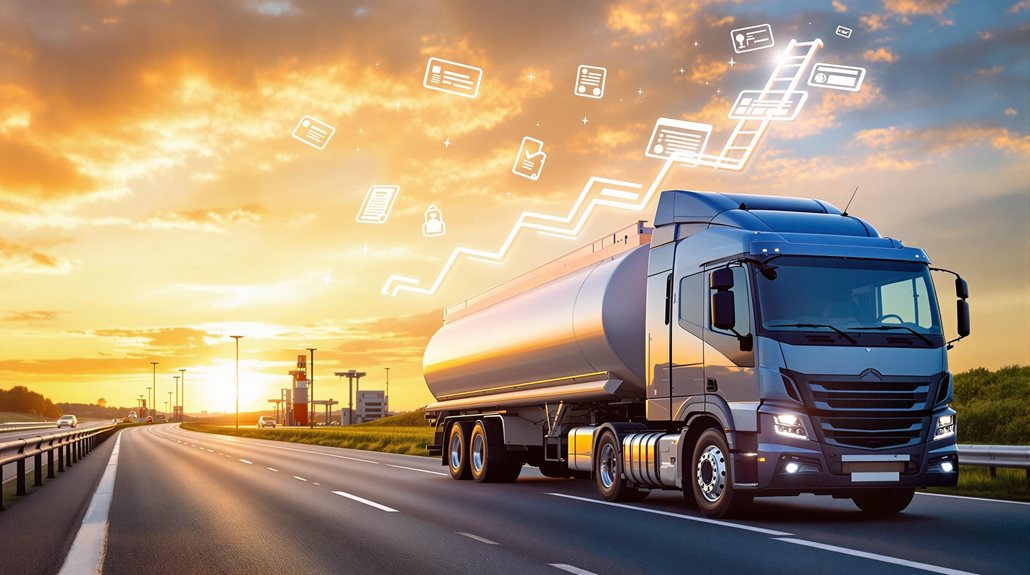Fuel delivery services are often misunderstood in regards to their operational complexity and professional requirements. Contrary to common belief, these services involve highly skilled professionals with CDL-A licenses, broad safety training, and extensive knowledge of DOT regulations. The work demands variable schedules, typically spanning 10-12 hour shifts, with competitive compensation ranging from $41,476 to $67,690 annually in most regions, and higher in metropolitan areas like New York City. Modern fuel delivery encompasses sophisticated technology, strict safety protocols, and advanced operational capabilities, while offering substantial career advancement opportunities. Understanding these aspects reveals a dynamic industry that's far more complex than most imagine.
Expert Highlights
- Fuel delivery driving isn't a typical 9-5 job, with most shifts lasting 10-12 hours and often occurring during nighttime hours.
- Earnings are higher than commonly assumed, with New York drivers averaging $66,301 annually plus benefits and bonuses.
- The job requires more than just driving skills, including technical knowledge, mathematics proficiency, and strong communication abilities.
- Local fuel hauling offers more regular schedules than most people think, especially compared to long-haul trucking positions.
- Career advancement opportunities exist beyond driving, including paths to management positions and independent business operations.
The Reality of Work Hours

Working as a fuel delivery driver involves a demanding and variable schedule that reflects the industry's round-the-clock nature. Typical shifts range from 10 to 12 hours, with many drivers operating during nighttime hours to avoid traffic congestion and optimize delivery efficiency. Sixty-hour workweeks are standard in the industry. This intensive schedule allows drivers to deliver essential services that save one hour per truck daily for their clients.
While local fuel hauling often provides more predictable schedules than long-haul positions, overtime remains common, particularly during peak demand periods. Drivers frequently exceed 40 hours per week, with some working upwards of 60 hours when necessary. Additionally, some fuel delivery companies offer 24/7 Roadside Assistance Coverage to ensure that any logistical issues encountered during delivery can be promptly addressed, minimizing service disruptions.
The implementation of slip seat arrangements allows companies to maximize truck utilization through driver rotation, though this requires careful coordination. Despite the challenging hours, many professionals in the field appreciate the consistency of local routes and the ability to return home daily, enabling them to maintain a balanced lifestyle while meeting the demands of fuel delivery operations.
Understanding Fuel Delivery Pay
Fuel delivery drivers in New York earn vastly higher wages compared to the national average, with annual salaries ranging from $41,476 to $67,690 and hourly rates averaging $28.25. The compensation structure typically includes opportunities for overtime pay, performance bonuses, and extensive benefits packages that enhance the overall value of the position. The Car Battery Jump Start Service available 24/7 in Minneapolis and St. Paul offers a similar model of ensuring reliable and timely assistance to service needs. A Class A CDL Driver represents the highest-paying position in the industry at $73,397 annually.
Shift differential pay adds another layer of earning potential for drivers working non-standard hours or weekend shifts. Career advancement possibilities, combined with the potential for increased earnings through experience and specialized certifications, make fuel delivery driving a viable long-term professional path within the transportation and energy sectors.
Salary Ranges and Benefits
A career in fuel delivery offers competitive compensation packages that vary considerably based on location, experience, and employer. In New York City, fuel delivery drivers earn between $58,788 and $75,439 annually, with the average salary reaching $66,301. These figures align favorably with the national range for tanker truck drivers, which spans from $24,500 to $90,500. Real-time compensation data from professional salary tracking services helps employers set accurate pay targets for the industry.
Beyond base salaries, professionals in this field typically receive extensive benefits packages, including health insurance, retirement plans, and paid time off. Many employers offer performance-based incentives, signing bonuses, and additional compensation for specialized certifications or hazardous materials endorsements. Factors such as driving record, equipment expertise, and load types significantly influence earning potential, while high-demand locations and team driving opportunities can substantially increase annual income through enhanced operational efficiency.
Career Growth Opportunities
Beyond competitive salaries, the fuel delivery industry presents robust opportunities for long-term career advancement. Established companies in this sector demonstrate remarkable stability, offering expansive professional development programs that encompass everything from technical skills to leadership training. Employees benefit from structured advancement pathways, including opportunities to progress into management positions or become independent lease operators.
The industry's commitment to continuous learning is evidenced through extensive safety training programs, regular skill development workshops, and recognition systems that reward excellence. Companies prioritize internal promotion, actively cultivating future leaders from within their existing workforce. This approach, combined with a supportive work environment and well-maintained equipment, creates an ideal foundation for sustainable career growth while maintaining a healthy work-life balance through predictable schedules and ample time off.
Compensation Vs Industry Standards
Throughout the fuel delivery industry, compensation structures reflect a complex interplay of regulatory requirements, reimbursement policies, and competitive market forces. Professional fuel carriers must navigate intricate wage compliance regulations while guaranteeing their reimbursement policies adequately cover variable expenses like fuel costs and vehicle maintenance without reducing wages below federal minimums.
Industry standards dictate that employers provide reasonable approximations for expense reimbursements, particularly for vehicle-related costs directly attributable to company operations. While the IRS mileage rate isn't mandatory, companies must safeguard their compensation frameworks account for actual expenses incurred during fuel transport activities. This includes consideration of both variable costs such as fuel and maintenance, as well as proportional fixed expenses like vehicle registration when the vehicle serves business purposes.
Skills Required for Success

Success in fuel delivery services demands an extensive skill set that combines technical expertise, safety awareness, and professional competence. Professionals in this field must possess valid credentials including a CDL-A license with specific endorsements, while maintaining thorough knowledge of DOT regulations and safety protocols. Advanced operational capabilities encompass precise loading techniques, efficient route management, and masterful vehicle handling. Just like on-site gas delivery(#) in roadside assistance, fuel delivery involves prompt and efficient service to ensure customer satisfaction and maintain reliability. Licensure requirements extend beyond basic CDL-A to include HAZMAT, tanker, and other specialized endorsements, guaranteeing safe transport of petroleum products. Technical proficiency includes expertise in loading procedures, equipment operation, and maintenance protocols. Professional competencies combine mathematical accuracy, effective communication skills, and strategic time management abilities. These multifaceted requirements guarantee the safe, efficient, and reliable delivery of fuel products while maintaining compliance with industry standards.
Local Business Impact
Mobile fuel delivery services create significant opportunities for local economic development through their integration with existing business networks and the creation of new partnerships. These services foster community growth by generating employment opportunities and establishing mutually beneficial relationships with local fleet operators, construction companies, and other fuel-dependent businesses. The ripple effect of mobile fuel delivery extends beyond direct service provision, as local businesses experience increased operational efficiency and cost savings, which enables them to reinvest in their communities and contribute to regional economic stability. Additionally, lockout roadside aid can further support local economies by providing essential services to vehicle owners in various circumstances, ensuring continued mobility and access to work and services.
Community Growth Opportunities
A sizable number of local businesses experience tangible growth opportunities through fuel delivery services, which create ripple effects throughout the community.
The implementation of mobile fueling solutions generates substantial time savings, environmental benefits, and enhanced safety measures that collectively foster economic development.
Communities benefit from reduced traffic congestion, improved air quality, and optimized resource utilization, leading to increased productivity and sustainable growth.
- Decreased vehicle congestion around traditional gas stations results in shorter commute times and enhanced workforce efficiency
- Mobile fuel delivery services support remote areas, enabling economic development in previously underserved regions
- Implementation of real-time monitoring systems and professional delivery protocols enormously reduces safety risks, lowering community healthcare and insurance costs
Supporting Regional Economic Development
The implementation of fuel delivery services sparks significant regional economic development through multiple channels of business impact. These services create sustainable employment opportunities across multiple sectors, from operational roles like drivers and customer service representatives to technical positions in software development and systems management.
The economic benefits extend beyond direct employment, as mobile fuel delivery enhances accessibility in underserved areas, enabling business growth and operational efficiency. This improved infrastructure supports local enterprises, particularly those dependent on transportation and logistics.
Additionally, the optimization of fuel delivery routes reduces traffic congestion and transportation costs, leading to increased productivity for businesses. The resulting economic stability promotes investment in local communities, while environmentally conscious delivery practices contribute to long-term regional sustainability and reduced healthcare expenses.
Small Business Partnership Benefits
Strategic partnerships between fuel delivery services and small businesses consistently yield substantial operational advantages for local enterprises. By establishing dedicated fuel delivery arrangements, small businesses can drastically reduce their operational costs while improving their efficiency through streamlined fuel management processes. These partnerships enable companies to maintain consistent operations without the burden of monitoring and managing fuel supplies independently.
Customized delivery schedules align precisely with business operational needs, eliminating unnecessary downtime and scheduling conflicts. Direct-to-site fuel delivery eliminates multiple trips to fuel stations, reducing vehicle wear and employee time allocation. Bulk purchasing agreements provide predictable pricing structures, enabling more accurate budget forecasting and cost control.
The collaborative nature of these partnerships guarantees small businesses maintain competitive advantages while contributing to local economic stability through optimized resource management.
Safety Standards and Protocols

Safety standards and protocols form the cornerstone of successful fuel delivery services, encompassing detailed measures for vehicle operations, environmental protection, storage management, and emergency preparedness. These inclusive protocols guarantee the safe handling and transport of flammable materials while safeguarding both personnel and the environment. Additionally, roadside assistance services such as tire change and towing are essential components of comprehensive vehicle support, ensuring proper equipment and skills are employed for customer safety.
| Safety Component | Required Measures |
|---|---|
| Vehicle Safety | IoT tracking, regular inspections |
| Environmental | Emission compliance, spill response |
| Storage | Approved containers, ventilation |
| Emergency | Response plans, evacuation routes |
| Training | Regular drills, certification updates |
Our industry maintains rigorous compliance with regulations through meticulous documentation, routine equipment maintenance, and continuous staff training. Advanced IoT technology enables real-time monitoring of delivery operations, while established emergency protocols ensure swift responses to potential incidents. Environmental protection measures, including spill containment systems and eco-friendly alternatives, demonstrate our commitment to sustainable practices.
Customer Service Excellence
Building upon robust safety protocols, outstanding customer service represents another cornerstone of successful fuel delivery operations. Through sophisticated CRM systems and personalized service offerings, modern fuel delivery providers create tailored experiences that address individual customer needs while dispelling common misconceptions about convenience and reliability.
Dinkytown, MN is well known for its various local restaurants and affordable dining options, complementing the myriad of services available in the area, including roadside assistance services like fuel delivery.
By maintaining transparent communication channels and responsive 24/7 support, these services establish trust and long-term relationships with their clientele.
- Exhaustive customer profiles enable customized delivery schedules and fuel preferences
- Advanced tracking systems provide real-time updates and precise delivery windows
- Data-driven loyalty programs offer personalized rewards based on usage patterns
This systematic approach to customer service excellence transforms traditional perceptions of fuel delivery from a mere convenience into an essential, value-added service that consistently exceeds expectations while fostering strong customer relationships.
Technology in Modern Delivery

Modern fuel delivery services leverage advanced technologies to enhance operational efficiency and customer satisfaction through comprehensive digital systems.
The integration of mobile applications with smart fuel monitoring equipment enables real-time tracking of fuel levels, delivery status, and vehicle performance metrics. These technological innovations, including IoT sensors and automated tracking systems, have transformed traditional fuel delivery into a data-driven, precise operation that optimizes routes, reduces waste, and guarantees timely service to customers.
Digital Tracking Systems
Digital tracking systems have revolutionized fuel delivery services through four key technological components: real-time location monitoring, automated data collection, route optimization, and enhanced security protocols. These sophisticated systems integrate RFID technology, GPS tracking, and intelligent video cameras to guarantee precise delivery operations while maintaining stringent security standards.
The implementation of fiber optic cables and flow sensors provides tamper-resistant monitoring of fuel movement throughout the delivery process.
Advanced monitoring systems detect driver presence and respond to emergencies through Safety Intelligent Video Cameras. Automated data collection eliminates manual entry errors and provides immediate upload to centralized management systems. Georeferenced route optimization enhances delivery efficiency while maintaining compliance with security protocols.
Through these integrated technologies, fuel delivery services maintain unprecedented levels of accuracy, security, and operational efficiency in their daily operations.
Mobile App Integration
Through seamless mobile app integration, fuel delivery services have transformed their operations by connecting customers, drivers, and service providers on a unified digital platform. This sophisticated technology enables thorough user profile management, real-time order tracking, and secure payment processing, establishing a reliable framework for efficient fuel delivery operations.
The integrated system facilitates precise route optimization and delivery scheduling while maintaining transparent communication between all parties involved. Customers can monitor their deliveries in real-time, access detailed delivery histories, and manage their fuel requirements through user-friendly interfaces.
Meanwhile, drivers benefit from streamlined route planning, automated documentation processes, and efficient delivery management tools. This technological infrastructure guarantees accuracy in fuel quantity measurements, maintains delivery records, and processes transactions securely through multiple payment gateways.
Smart Fuel Monitoring
Smart fuel monitoring has revolutionized the fuel delivery industry by implementing sophisticated tracking and analytics systems that ascertain precise control over fuel operations. Through advanced IoT sensors, GPS tracking, and real-time analytics, companies can now monitor every aspect of their fuel delivery process with unprecedented accuracy and efficiency. This technology enables immediate detection of anomalies, from fuel theft to equipment malfunctions, while upholding regulatory compliance and operational optimization.
Cloud-based servers analyze real-time data from multiple monitoring points, generating thorough reports on fuel transactions and consumption patterns. Tamper-resistant solutions and electronic authentication systems maintain security throughout the delivery process. Intelligent fleet management systems optimize routes based on traffic conditions and fuel demand, while monitoring driver behavior and vehicle performance.
These integrated systems work together to provide reliable, secure, and efficient fuel delivery operations.
Environmental Benefits of Delivery
As businesses and individuals seek more sustainable solutions, fuel delivery services have emerged as an environmentally conscious alternative to traditional gas station visits. These services considerably reduce carbon emissions by eliminating multiple refueling trips and optimizing delivery routes through advanced GPS tracking systems.
The environmental impact extends beyond reduced emissions. By implementing secure on-site storage solutions and professional handling procedures, fuel delivery services minimize the risk of spills and contamination that can occur at traditional gas stations. In addition, these services contribute to decreased traffic congestion around gas stations, particularly during peak hours, resulting in improved air quality in urban areas.
The combination of optimized routing, reduced vehicle trips, and enhanced safety measures creates a thorough approach to environmental stewardship in fuel distribution operations.
Career Growth Opportunities

Fuel delivery services offer robust career advancement opportunities across multiple professional pathways. Industry leaders provide thorough training programs, competitive compensation packages, and clear paths for professional development. Companies like Booster, Pilot Flying J, and Bottini Fuel demonstrate strong commitments to employee growth, with 30% of service professionals advancing to higher positions.
Entry-level positions begin with attractive salaries ranging from $52,000 to $62,400, complemented by extensive benefits including medical coverage and 401k matching.
Career progression opportunities span roles from certified delivery partners to fleet managers, trainers, and leadership positions.
Professional development includes specialized training in safety protocols, advanced driving techniques, and fuel handling regulations, ensuring continuous skill enhancement throughout one's career.
Community Connection and Support
The impact of mobile fuel delivery services extends far beyond individual convenience, reaching deep into the fabric of local communities. These services strengthen community resilience by ensuring consistent fuel access in remote areas, supporting emergency services, and fostering economic stability through reduced operational costs for local businesses.
The environmental benefits create healthier communities through decreased emissions and improved air quality, while enhanced safety measures reduce traffic congestion and accident risks. Mobile fuel delivery services particularly demonstrate their value during crises, maintaining essential operations when traditional infrastructure may be compromised.
Roadside Assistance FAQ
Do Fuel Delivery Drivers Need Special Certifications to Handle Different Fuel Types?
Yes, fuel delivery drivers must obtain a CDL with both hazmat and tanker endorsements, plus complete specific hazmat training for different fuel types every three years.
Can Customers Schedule Recurring Deliveries at Specific Times Each Month?
Yes, customers can schedule recurring deliveries at specific times monthly, weekly, or bi-weekly. Our flexible scheduling system allows you to choose convenient delivery times that work with your routine.
What Happens if There's a Fuel Spill During Delivery?
If a fuel spill occurs, our team immediately evacuates the area, contains the spill using barriers and absorbent materials, notifies authorities, and initiates professional cleanup following strict safety protocols.
Are Fuel Delivery Vehicles Equipped With Emergency Shutoff Systems?
Yes, all fuel delivery vehicles are equipped with mandatory emergency shutoff systems that include valves, sensors, and control mechanisms designed to immediately stop fuel flow during emergencies.
Do Weather Conditions Affect the Ability to Make Fuel Deliveries?
Weather greatly impacts fuel delivery operations, affecting road conditions, delivery schedules, and overall logistics. Our industry adapts by utilizing alternate routes, monitoring forecasts, and maintaining flexible delivery plans.
